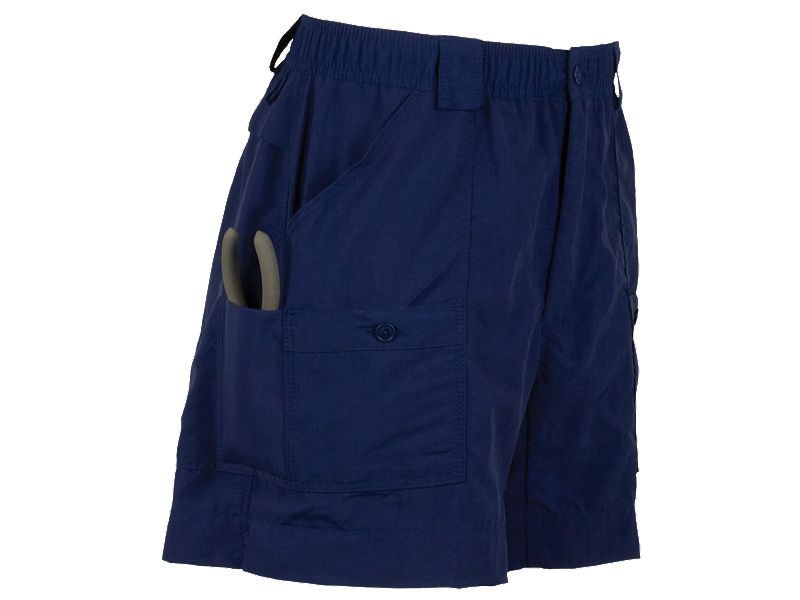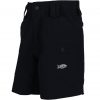Aftco Bluewater Men’s “Original” Traditional Fishing Shorts
$65.00
AFTCO Bluewater “Original” Traditional Fishing Shorts are standard attire the world over. Constructed of 3-ply Supplex that sheds water, dries fast, resists abrasion, puncture, and tearing and are as soft as cotton.
About the Company AFTCO
DEFEATING THE LONGLINES
Sportfishermen and conservation groups continue to battle the destructive affects of the established longline commercial fishing industry on the East Coast, Gulf Coast and in Hawaii. While those longline battles are never over, no similar battle is being fought on the West Coast because there is no established longline industry. The main reason for that fact is that, some 20 years ago, AFTCO was successful in preventing the longliners from practicing their trade in California.
In 1988, AFTCO President Bill Shedd received a confidential phone call from inside the California Department of Fish and Game (CDFG) that said the state’s established “experimental” shark longline fishery was about to be sanctioned as a full-fledged fishery with the blessing of the CDFG. If that happened, the caller warned that the mako shark nursery off southern California would be in serious jeopardy. The caller also said CDFG insiders did not know where else to turn — United Anglers of Southern California (UASC) was not yet established — and they hoped that the Shedds and AFTCO could be of help to counter the momentum already underway.
On the same day as that phone call, Bill Shedd decided AFTCO would take on the “elimination of the shark longline experiment” as an AFTCO company project. Bill was already deeply involved in the gillnet issue on behalf of AFTCO, so AFTCO Sales Manager Greg Stotesbury was assigned the task to lead the company effort. Greg was perfect for the job because he had fished mako sharks for nine years, understood the fishery and the damage that had already been done from the experimental longlines and the existing drift gillnet fishery.
For the next four years, Greg and other AFTCO employees contributed more than 1,500 hours toward eliminating the longline fishery. Finally, in 1992, AFTCO and a group of conservation-minded shark fishermen aligned themselves with the newly formed UASC, and in May of of that year, AFTCO chartered a bus to transport concerned shark anglers to the Fish and Game hearing in Bakersfield, CA. Greg and Bill presented the case and both the CDFG and the Fish and Game Commission unanimously agreed to eliminate the shark longlines.
With their failure at the Commission level, the shark longliners then took their case to the California legislature, where they convinced assemblyman Dan Hauser to carry legislation (AB2924) to create a permanent shark longline fishery. The bill was stopped by Greg and John Beuttler of United Anglers (UAC), who went to Sacramento to meet with Hauser. When they explained why the fishery had been rejected by the CDFG and the Fish and Game Commission, Hauser withdrew his bill.
Just when we thought the longline issue was behind us and that AFTCO personnel could now focus solely on running the fishing tackle business, a different group of commercial fishermen, led by attorney Augie Felando, initiated a move to create a longline fishery for swordfish, sharks and tuna.
AFTCO attorney Mike Duffy was recruited by Bill Shedd to lead this new effort against longlines, and he chaired a committee that consisted of Greg Stotesbury, Bill Shedd, Rich Holland and Balboa Angling Club President Jock Albright. While the work in this effort was conducted under the banner of and in partnership with UASC, the organization was still very young at the time, so most of the heavy lifting was done from the AFTCO offices at AFTCO expense.
The strategy and various presentations at the Commission hearing were developed and written primarily by AFTCO attorney Mike Duffy and AFTCO President Bill Shedd. In total, over a five-month period, AFTCO personnel spent more than 1,000 hours working to defeat this longline push. The time and effort was well worth the reward when on October 2, 1992, a unanimous vote by the Fish and Game Commission denied the request for a longline fishery in California waters.
From 2001 to 2005, UASC (with the help of AFTCO production manager, Dave Elm, then a board member and now chairman of UASC) — along with The Billfish Foundation (TBF), National Coalition for Marine Conservation (NCMC), and others — led a successful effort before the Pacific Fisheries Management Council to once again prevent the establishment of longlines on the West Coast. While AFTCO was not involved in as significant a way, our work long ago to remove and keep longlines out of California waters played a big role in the recent success. If AFTCO had not invested over 2,500 hours of time some 15 to 20 years ago and the longline industry had established itself in California waters, this most recent battle would have been much more difficult. Without AFTCO’s early efforts, those of us in southern California possibly would now find ourselves in the same difficult situation facing the East Coast, Gulf Coast and in Hawaii, where they are still trying to remove the established longline fisheries.



